
Snapchat had us worried for a minute there. When the multimedia messaging app started losing users, we wondered if it would survive. But according to The Verge, things have never been better for the platform. Snapchat’s user base has stabilised and the platform is earning more revenue than ever.
With 186 million users on Snapchat, the social network is an up-and-coming place to market goods and services.
In this article, we’ll show you how to use Snapchat to grow your audience and boost your return on investment. Also, like your other social channels, Snapchat has its own advertising tools. Read on to find out how to market on Snapchat.
To Snapchat or not to Snapchat?
Before starting any social media campaign, you must consider your audience. Most audiences spend time on social media these days. But you have to do your research to find out which audiences use which social media.
Unlike Facebook, whose users belong to several demographics, Snapchat has just one main demographic: young people. In America, 78% of people aged 18 to 24 use Snapchat.
As you can see from these statistics, Snapchat is a valuable tool when marketing to young people. But with only 7% of internet users used 50+ on Snapchat, it is virtually useless for marketing to older demographic.
How to get followers
Also unlike other channels, Snapchat marketing has limited potential for organic reach. The only way your brand can appear on the Discover page is by buying an advertisement.
Snapchat also doesn’t recommend branded accounts to users. You have to get creative and find other ways to get more followers. Here are some suggestions.
Social networks
Promote your Snapchat via Twitter, Facebook, Instagram or any other social media you are currently using.
Promote your Snapchat to your email newsletter audience. Simply place a link to your Snapchat URL on every email you send out.
Snap Codes
Place a Snap Code, or a QR code, on your printed marketing collateral such as flyers, posters, and more. Users scan this code with their Snapchat Apps to instant to follow you.
How to advertise with snapchat marketing
What Snapchat doesn’t get you in organic reach, it had the potential to make up for through paid advertising.
Snapchat has five different ad types, each with their own benefits. The versatility and creative potential of these ads can lead to effective Snapchat marketing campaigns.
Let’s take a closer look at each type of ad.
Snap Ads
Snap Ads are the typical type of ad you find in your feed. They come in full screen and display between stories. Snap Ads can contain videos or photos, which offers a lot of versatility for your content creation.
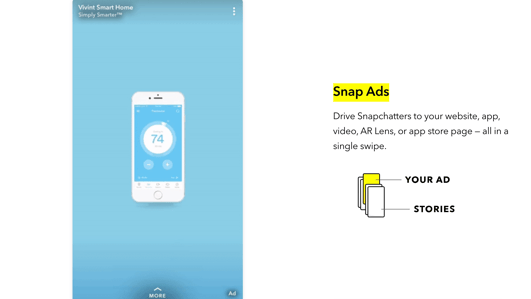
Users who like the look of your ad can swipe up to learn more. You can link your ad to an out-of-application landing page or website. On the flip side, users can also tap to the right to skip an ad. Your ad has to grab attention to be effective.
Collection Ads
Collection Ads are similar to Snap Ads in that they can contain videos and photos. The only difference is that a Collection Ad advertises several products at once. The display features multiple product icons for the user to tap.
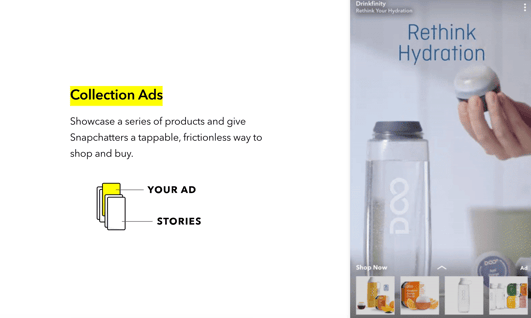
Collection Ads are great for when you have multiple products on offer and want to be able to direct your users to the correct product page on your website.
Story Ads
Story Ads are almost identical to Snap Ads except for where they appear. Story Ads display on the discover page. With a Story Ad, your brand gets its own position on Discover.
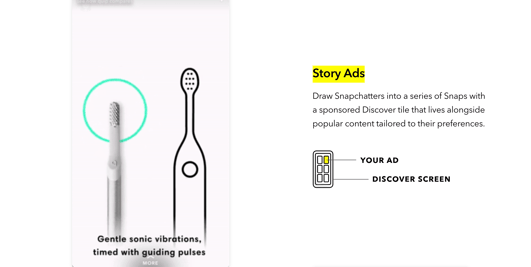
The advantage of Story Ads is that users see your ad when scrolling through stories. But there’s a catch. A user has to tap your ad for it to start playing.
AR Lenses
AR Lenses are like the filters described above but allow users to interact with your filter. Users can use movement, face tracking and other features to create their snap or story.

Filters
This type of ad is a sponsored image overlay on a user’s video or photo snap. In other words, it puts your product over a person-to-person snap or story.
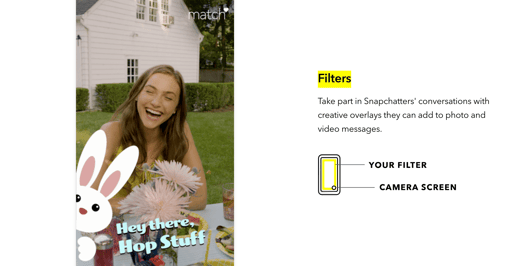
Filters are a great way to reach users you didn’t grab through stories or Discover. Your filter ad also gets shown two times, once when making, and once when receiving a snap.
Captivating your audience
Even if your target demographic is perfect for Snapchat marketing campaigns, such as in the case of a school leaver audience, you need to motivate your audience to follow you on Snapchat. So how do you do this?
Forget about repurposing content from your other social media channels. This is not enough to reel your audience into your Snapchat marketing campaigns. Instead, create original content they can only get through Snapchat.
Snapchat is perfect for exclusive content like videos showing what goes on “behind-the-scenes” of your business. You can also use it to preview upcoming offerings, and create other out-of-the-box clips revealing the lesser known side to your business.
The importance of analytics
Social media marketing has great potential—when used correctly. And to reap the benefits from any social campaign, you need to set measurable goals and calculate your return on investment.
With quintly's Snapchat Story Studio Analytics you’ll get deep insights into every Show, every Story within a show and every Snap within a story. With this data, you can continue to optimize your campaigns and boost your bottom line.
Break the analysis down to every piece of content you put out there and compare it to each other.
Only then you’ll be able to understand your audience in a much deeper way - who are they, what kind of content do they like, what topics are they most and least interested in?
The new place to market
Snapchat is an arbitrage that shouldn’t be underestimated. With the number of users and advertisers growing everyday, Snapchat is the new place to market. Use Snapchat to grow your audience, make sales, and boost your return on investment. We recommend integrating Snapchat into your marketing and social media campaigns in 2020.
Related articles
40 social media buzzwords every marketer needs to know
Display social media data with quintly and Brandwatch Vizia
5 reasons to connect with your customers on social media
How to identify social media trends
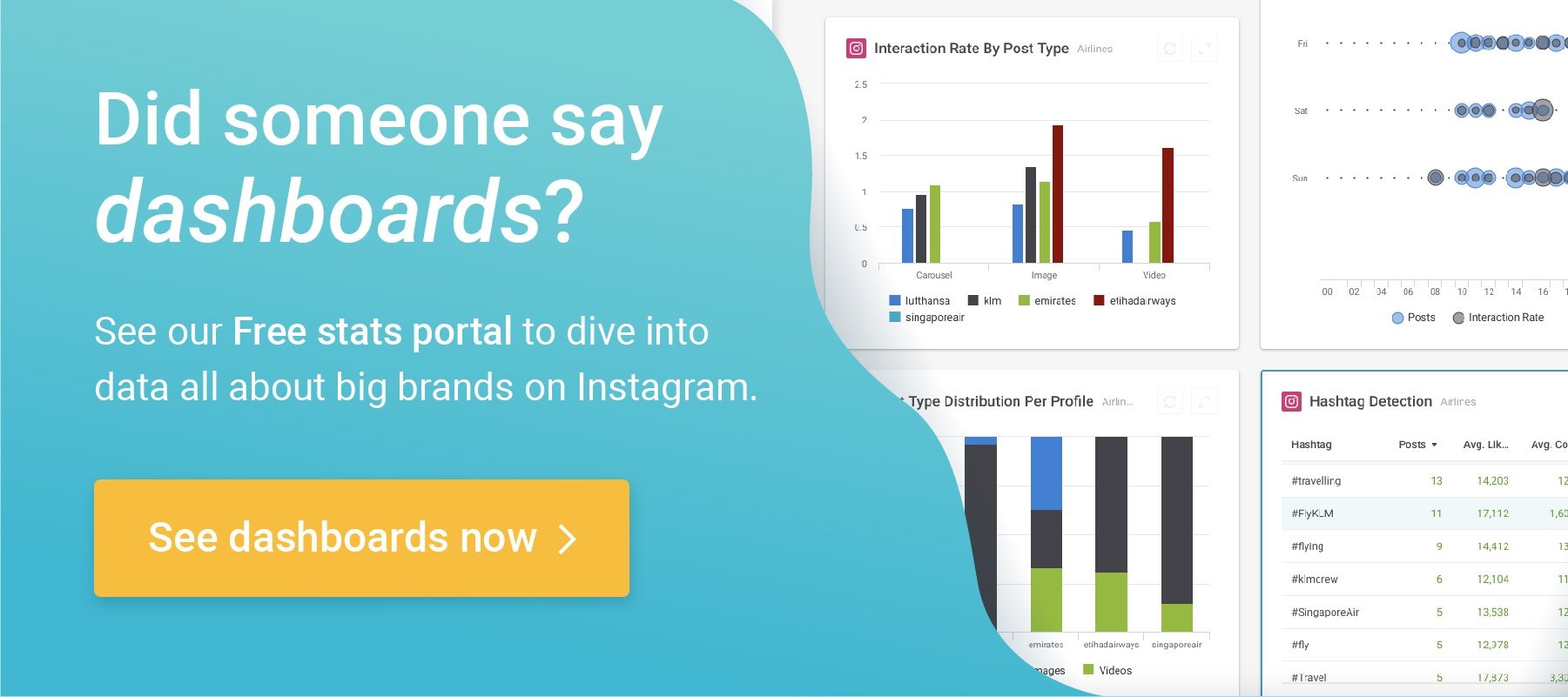

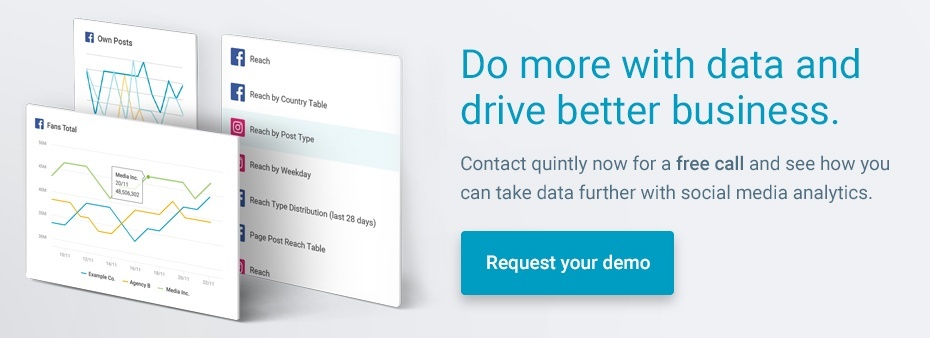

Join the conversation. Leave us a comment below!